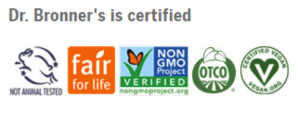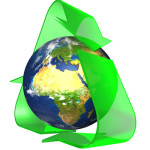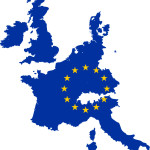Sustainable Palm Oil – A Case in Point
Two companies that make organic products say that palm oil is essential to their operations. But they want no part of the conventional supply chain – which they have linked to allegations of deforestation – and claim to have found another solution. This calls for closer inspection.
Rapunzel Naturkost GmbH, with its headquarters in southern Germany, produces organic foods like noodles, spreads and muesli. Dr Bronner´s is an organic soap and cosmetics company that originated in Germany but is now based in California.
Many of Rapunzel´s products contain palm oil. Given that the ingredient does not sit well with most German consumers, making such products appears to stand at odds with Rapunzel´s self-proclaimed focus on doing good.
The company addresses this issue in that it openly advocates palm oil as a valuable and healthy ingredient. It says it cannot and will not do without palm oil, at least from a health perspective. However, the environmental issue remains. Rapunzel claims to source 100% of its palm oil needs from fully sustainable farms in Ecuador and Ghana.
Rapunzel´s partner in Ecuador is Natural Habitats. From the organisation´s website, it is not possible to discern what it is: a cooperative, a company or a buyer of palm oil. Rapunzel claims that the sustainability criteria followed by Natural Habitat go “far beyond” those of the Roundtable on Sustainable Palm Oil (RSPO).
 Two certificates are mentioned: ‘Hand in Hand’ and ‘Fair for Life’. The former is Rapunzel´s own. The company claims that it is regularly controlled by the Institute for Marketecology (IMO). This is part of the French Ecocert, an organic certification company. ‘Fair for Life’ is a fair trade certificate from the IMO. It is not clear if either one certifies sustainable farming practices in Ecuador.
Two certificates are mentioned: ‘Hand in Hand’ and ‘Fair for Life’. The former is Rapunzel´s own. The company claims that it is regularly controlled by the Institute for Marketecology (IMO). This is part of the French Ecocert, an organic certification company. ‘Fair for Life’ is a fair trade certificate from the IMO. It is not clear if either one certifies sustainable farming practices in Ecuador.
Other claims might raise an eyebrow. Horses and mules are said to be used to transport fruit bunches in small carts from oil palm plantations. The oil mill run by Natural Habitat is said to be energy independent through burning the seed heads for fuel. Fertilisation of oil palm trees takes place by planting leguminous crops (that absorb nitrogen) near the roots. Hydrogenation is referred to as ‘gently treating with steam’.
Research indicates that Natural Habitat seems identical to the Dutch company Harrogate Ventures BV. They name Alfons Van der Aa as founder and president, while the sustainability manager is Ecuadorian national Jessenia Angulo. Both entities have the same address in Rotterdam. It appears that Harrogate is a financial holding that also has interests in Ghana and is represented in California.
Dr Bronner´s: ‘All-One!’
Dr Bronner´s produces cosmetics and personal care products like lip balm, lotions and shaving cream, but is famous for its Castile bar soap. For its palm oil needs, it operates Serendipalm Co Ltd, a sister entity in Ghana, western Africa.
The Serendipalm website states that its mill began production in 2008 and that it has since become ‘the world’s largest Fair Trade & Organic palm oil project working exclusively with smallholder farmers’. It claims to buy oil palm fruit from over 670 family farms with plots averaging seven acres in size.
Somewhat surprisingly, the website puts the production volume at 500+ tonnes. Supposedly this is not only enough to supply Dr Bronner´s production, but also to sell to ‘several renowned European Fair Trade companies’. Actually, only two companies are mentioned. One is a German organic online shop called ‘GEPA – the fair trade company’. The other is Rapunzel.
Dr Bronner´s sports several certificates on its webshop, among them the ‘Fair for Life’ certificate also used by Rapunzel. Again, it is not clear if any of them actually certify sustainable palm oil production.
Sounds great, but is it true?
On closer inspection, the claims about the exclusive sourcing of fully sustainably produced palm oil leave the observer somewhat sceptical. Some unanswered questions:
- Where does all the sustainably produced palm oil come from? Both Rapunzel and Dr Bronner´s are sizeable companies. Is the artisan production of palm oil in Ecuador and Ghana, relying on manual labour and beasts of burden, really enough to supply all the raw materials these companies process? And there supposedly even remains a production surplus to sell to other takers.
- Who really are the sustainable producers? A rather complicated web of farmers, millers and middlemen, as in the case of Natural Habitats and Harrogate Ventures, raises more questions than answers. At the very least it can be said that a transparent supply chain is not what is being presented.
- What is certified by whom? The blanket claims of ‘fully organic’ palm oil are difficult to confirm. In checking the ‘Fair for Life‘ database for certified organisations in Ecuador, the company Exporsustent SA (Director: Jessenia Angula, also Harrogates’ sustainability manager) is mentioned. It is an association of oil palm
The certificate itself pertains to fair trade practices. But what about sustainable production at the farm level? Natural Habitats, as the owner of Exporsustent, is a member of the RSPO. But does that mean that production two or three more rungs down the ladder is certified?
Concern over the state of the environment, as displayed by companies like Rapunzel and Dr Bronner´s, is probably genuine. However, it is not unlikely that they will find themselves caught between artisan palm oil production, and economic as well as agronomic realities.
As demand for certified sustainable palm oil grows, cooperatives in Ghana and Ecuador may not be able to deliver. And while only about 50% of the current production gets sold, this might change quickly. Thus, instead of giving in to frustration, Malaysian producers should spot an opportunity.
MPOC Brussels











Leave a Reply